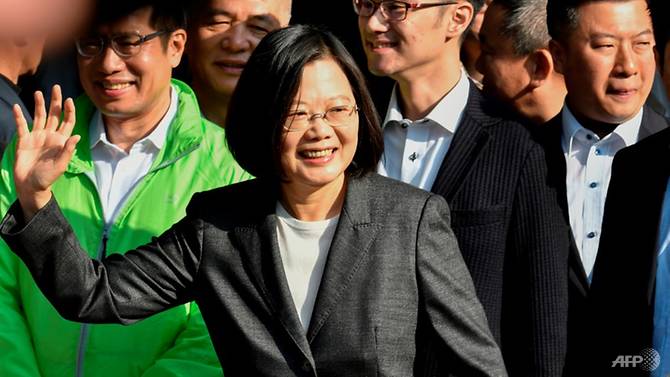Taiwan’s President Tsai Ing-wen was, on Saturday, re-elected to a second four-year term in office.
Tsai, who heads the pro-independence Democratic Progressive Party (DPP) won by a 20 percentage point margin over Han Kuo-yu, of the main opposition and pro-unification Kuomintang (KMT).
Tsai garnered 7.9 million votes, or 57%, compared to Han, who won his party’s nomination just over a year after being elected mayor of Kaohsiung, Taiwan’s second-largest city.
Han won 5.3 million ballots, or 38%, with 98% of precincts having reported, Taiwan’s Central News Agency reported, citing data from the Central Election Commission.
Tsai was elected amidst heightened and months-long tension between China and Hong Kong, in what observers say could be an indication of what things could be like if Taiwan and China were to reunite.
“Taiwan is showing the world how much we cherish our free democratic way of life and how much we cherish our nation,” Tsai told the media after her election victory.
China claims self-ruled Taiwan as part of its territory and has threatened to use force against the island and its 23 million people if it declares formal independence.
China has wooed several of Taiwan’s allies since Tsai came to office, with only 14 of 193 United Nations member states recognising Taiwan as a state independent of China.
This compares to 21 allies when Tsai came to office in 2016.
St. Vincent and the Grenadines (SVG) is among a handful of Caribbean nations that maintain diplomatic ties with Taiwan.
And with general elections expected in SVG before year-end, Kingstown-Taipei ties is expected to become a campaign issue.
The main opposition New Democratic Party, under new leadership, is standing by the policy announced by the then leader in April 2016, that it will formally recognise Beijing, if elected to office.
In the meantime, Prime Minister Ralph Gonsalves of the ruling Unity Labour Party has expressed commitment to Kingstown-Taipei ties.
Last July, during an official visit to SVG, Tsai pledged Taiwan’s continued support to SVG in the areas of agriculture as well as infrastructural and human development.







We must say congratulation to Taiwan’s President Tsai Ing-wen on her win as she grapples at home with Communism, democracy, dark money, misinformation and the Taiwan/China issues.
Could mainland China take Taiwan by Force? This is a question that many are asking in this most faithful year for Taiwan’s President Tsai Ing-wen. https://www.youtube.com/watch?v=h97kHfPnHZk
For Beijing, Taiwan is most definitely unfinished business with reunification inevitable and China has directed its Armed Forces to be ready to take Taiwan by force in this year 2020, if necessary.
Although “Tsai Ing-wen was returned for a second term with a landslide in a repudiation of mainland China” nevertheless she is no doubt keenly aware that the Reds will eventually be coming her way.
https://www.aljazeera.com/news/2020/01/tsai-faces-choppy-china-waters-taiwan-election-landslide-200112054249712.html
Accordingly “Tsai faces choppy China waters after Taiwan election landslide. Emphatic victory underlines growing sense of identity on the island that China has vowed to take back by force if necessary”.
Further, “China has released rare footage of its nuclear-capable, hypersonic missile DF-26 being launched during a military exercise. The mighty weapon, commissioned to the People’s Liberation Army in 2018, is able to reach US territory and destroy aircraft carriers, according to previous reports”.
The US for its part has made it be known to China its continued policy of “freedom of navigation” in the South China Sea and its support for Tsai Ing-wen and Taiwan.
https://www.dailymail.co.uk/news/article-7864429/China-launches-hypersonic-nuclear-missile-able-reach-territory-military-drill.html
“Reports claimed DF-26 could strike a warship 3,728 miles away at Mach 18.The missile is said to be able to carry a four-megaton nuclear warhead and it could reach Guam, a US territory 2,000 miles from the Chinese coast”. In recent statement however a US personnel has said that as the US Warships are always on the move, this should make it most difficult for any such weapon as the DF-26 to strike them.